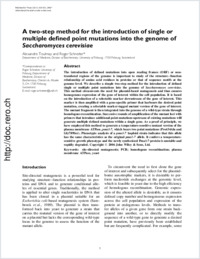A two-step method for the introduction of single or multiple defined point mutations into the genome of Saccharomyces cerevisiae
- Toulmay, Alexandre Department of Medicine, Division of Biochemistry, University of Fribourg, Switzerland
- Schneiter, Roger
-
21.08.2006
Published in:
- Yeast. - 2006, vol. 23, no. 11, p. 825-831
English
The introduction of defined mutations into open reading frames (ORF) or non-translated regions of the genome is important to study of the structure-function relationship of amino acid residues in proteins or that of sequence motifs at the genome level. We describe a simple two-step method for the introduction of defined single or multiple point mutations into the genome of Saccharomyces cerevisiae. This method circumvents the need for plasmid-based mutagenesis and thus ensures homogenous expression of the gene of interest within the cell population. It is based on the introduction of a selectable marker downstream of the gene of interest. This marker is then amplified with a gene-specific primer that harbours the desired point mutation, creating a selectable marker-tagged mutant version of the gene of interest. The mutant fragment is then integrated into the genome of a wild-type strain through homologous recombination. Successive rounds of amplification of the mutant loci with primers that introduce additional point mutations upstream of existing mutations will generate multiple defined mutations within a single gene. As a proof of principle, we have employed this method to generate a temperature-sensitive mutant version of the plasma membrane ATPase, pma1-7, which bears two point mutations (Pro434Ala and Gly789Ser). Phenotypic analysis of a pma1-7 haploid strain indicates that this allele has the same characteristics as the original pma1-7 allele. It confers a temperature-sensitive growth phenotype and the newly synthesized Pma1-7 protein is unstable and rapidly degraded.
- Faculty
- Faculté des sciences et de médecine
- Department
- Département de Biologie
- Language
-
- English
- Classification
- Biological sciences
- License
- License undefined
- Identifiers
-
- RERO DOC 5964
- DOI 10.1002/yea.1397
- Persistent URL
- https://folia.unifr.ch/unifr/documents/300192
Statistics
Document views: 85
File downloads:
- schneiter_tsm.pdf: 223
